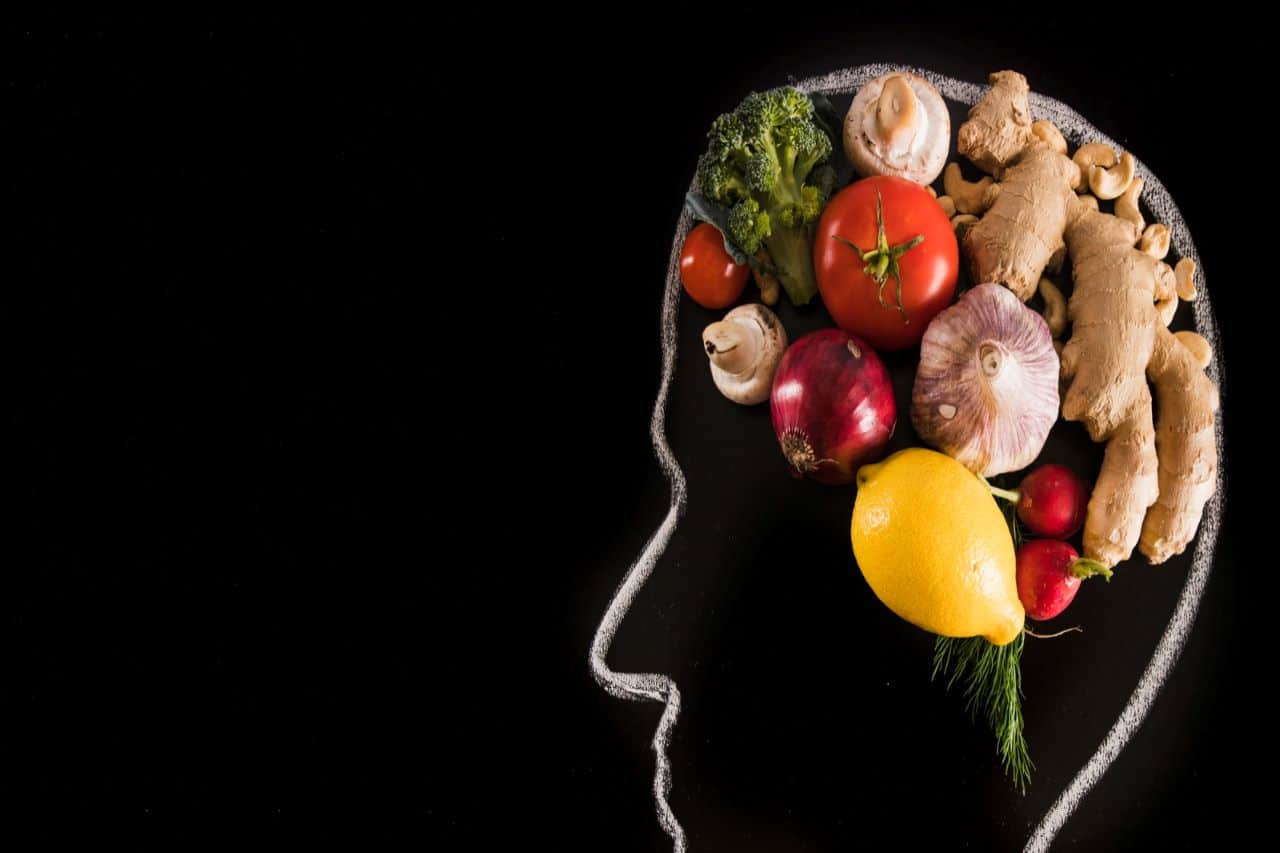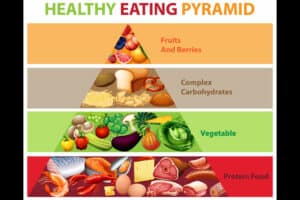We often look for ways to boost our well-being in our daily grind. We know the importance of a balanced diet for physical health, but what about our mental well-being? This article is about understanding how a balanced diet benefits our mental health. We will break down the connection between our food and our state of mind.
As we go along, we’ll see how the stuff in our meals – the nutrients – plays a significant role in shaping our mental health. This exploration aims to give you the insights to make smart food choices for a healthier mind.
Imagine a world where the things we eat not only power our bodies but also act as mood-boosting agents for our minds. Recent scientific findings unravel a fascinating link between our diet and mental well-being, expanding our view of overall health.
In this journey through the benefits of a balanced diet for mental health, we’ll uncover how specific nutrients can directly affect the brain, impacting everything from our mood to our thinking abilities.
Get ready to discover the secrets of a well-balanced diet that go beyond just keeping us physically fit. This exploration promises to open up a path to a sharper mind and a more stable emotional state.
The Foundations of Mental Health and Nutrition
1. Introduction to Mental Health:
Mental health is a foundational element of our overall health, often described as an individual’s emotional, psychological, and social well-being. It encompasses our thoughts, feelings, and behaviours, shaping how we handle stress, relate to others, and make decisions. Just as physical health is vital for a robust body, mental health is crucial for a fulfilling and balanced life.
Understanding mental health involves recognizing the spectrum of emotions, from happiness and contentment to stress and sadness. It’s an ongoing process influencing how we navigate our daily lives, build relationships, and handle challenges. A sound mental state is not merely the absence of mental disorders but encompasses resilience, coping mechanisms, and the ability to enjoy life despite its ups and downs.
The significance of mental health in our overall well-being cannot be overstated. It affects every facet of our lives, from personal relationships to professional pursuits. Nurturing mental health creates a foundation for a fulfilling life, fostering emotional stability and resilience in the face of life’s challenges.
2. Linking Diet to Mental Health:
Now that we’ve established the fundamental importance of mental health let’s delve into the intriguing connection between our diet and mental well-being. Research has increasingly demonstrated that what we eat has a profound impact on our mental state, influencing mood, cognition, and even the risk of developing mental health disorders.
Scientific evidence points to a bidirectional relationship between diet and mental health. On one hand, our mental state can influence our dietary choices – stress and mood swings may lead to unhealthy eating habits. On the other hand, the nutrients we consume can directly affect brain function and, consequently, our mental health.
Nutrients like omega-3 fatty acids, vitamins, minerals, and antioxidants play key roles in supporting cognitive function and emotional well-being. For instance, omega-3 fatty acids found in fish have been linked to reduced risk of depression, while specific B vitamins are essential for neurotransmitter production, impacting mood regulation.
As we explore the intricate interplay between diet and mental health, it becomes evident that our food choices are not just fuel for the body but also crucial influencers of our mental and emotional states. This understanding forms the basis for embracing a balanced diet as a proactive measure for promoting mental well-being.
Nutrients and Their Impact on the Brain
1. Essential Nutrients for Brain Health:
Now that we’ve established the foundation of mental health and its connection to our overall well-being, let’s zoom in on the nutrients that play a vital role in supporting
- Omega-3 Fatty Acids:
Found abundantly in fatty fish like salmon and walnuts, omega-3 fatty acids are renowned for their brain-boosting properties. Research suggests that these fats contribute to the structural integrity of brain cell membranes, supporting optimal communication between nerve cells.
- Antioxidants:
Fruits and vegetables rich in antioxidants, such as berries and leafy greens, play a crucial role in protecting the brain from oxidative stress. This stress, caused by free radicals, has been linked to neurodegenerative disorders, making antioxidants essential for long-term brain health.
- Vitamins and Minerals:
Specific vitamins, such as B vitamins (found in whole grains and leafy greens), and minerals like zinc (present in meat and legumes), are indispensable for neurotransmitter production. These chemicals facilitate communication between nerve cells, influencing mood, cognition, and overall mental function.
2. Role of Macronutrients:
Beyond these specific brain-boosting nutrients, the macronutrients—carbohydrates, proteins, and fats—also contribute significantly to brain health.
- Carbohydrates:
Often misunderstood, carbohydrates are the brain’s primary source of energy. Whole grains, fruits, and vegetables provide a steady supply of glucose, the brain’s preferred fuel, supporting concentration and cognitive function.
- Proteins:
Essential for producing neurotransmitters, proteins found in lean meats, dairy, and plant-based sources like beans and lentils contribute to optimal brain function. These neurotransmitters play a crucial role in regulating mood and emotions.
- Fats:
While excessive saturated fats can be detrimental, healthy fats like those in avocados, olive oil, and nuts are essential for the formation of cell membranes and the protection of nerve cells. These fats also aid in absorbing fat-soluble vitamins crucial for brain health.
Understanding the impact of these nutrients on the brain provides valuable insights into how our dietary choices influence cognitive function, emotional well-being, and long-term neurological health. In the next section, we’ll explore the concept of a balanced diet and its direct effects on mental health.
Balancing Act – The Importance of a Well-Balanced Diet
1. Defining a Balanced Diet:
As we navigate the intricate relationship between nutrition and mental health, it becomes evident that a well-balanced diet is a cornerstone for overall well-being. But what exactly does a balanced diet entail?
- Inclusion of Various Food Groups:
A balanced diet comprises a variety of foods from all major food groups, including fruits, vegetables, whole grains, lean proteins, and healthy fats. This diversity ensures a broad spectrum of nutrients essential for optimal bodily functions, including those crucial for brain health.
- Proportion and Moderation:
Balancing the proportion of different nutrients is key. It involves moderating the intake of carbohydrates, proteins, and fats to meet the body’s energy needs without excess. This balance supports stable blood sugar levels, which, in turn, contributes to sustained energy and mood regulation.
- Hydration:
Often overlooked, proper hydration is a fundamental component of a balanced diet. Water is essential for various bodily functions, including nutrient transportation and waste elimination. Dehydration can adversely affect cognitive function and mood.
2. Balanced Diet and Mental Health:
The link between a well-balanced diet and mental health is profound, extending beyond physical nourishment to directly impact our emotional and cognitive well-being.
- Mood Stabilization:
A balanced diet helps stabilize mood by providing a consistent supply of nutrients that support neurotransmitter production. Stable blood sugar levels, facilitated by a balanced intake of carbohydrates, contribute to mood regulation and reduce the risk of mood swings.
- Stress Reduction:
Nutrient-rich foods, such as those found in a balanced diet, play a role in mitigating the physiological effects of stress. Specific vitamins and minerals act as stress busters, helping the body cope with challenging situations and preventing the negative impact of chronic stress on mental health.
- Cognitive Function Improvement:
The brain requires a variety of nutrients to function optimally. A balanced diet ensures a steady supply of these nutrients, promoting cognitive function, memory retention, and overall mental sharpness.
Recognizing the importance of a well-balanced diet as a proactive measure for mental health empowers individuals to make informed food choices.
Foods for Mental Wellness
1. Mood-Boosting Foods:
Exploring the relationship between diet and mental health leads us to a fascinating realm of foods that can directly influence our mood and emotional well-being. Incorporating these mood-boosting foods into our diet can be a delightful and proactive way to support mental wellness.
- Dark Chocolate:
Rich in antioxidants and flavonoids, dark chocolate has been linked to improved mood and reduced stress. It also contains small amounts of caffeine, providing a gentle energy boost.
- Fatty Fish:
Fish like salmon, mackerel, and trout are rich in omega-3 fatty acids, and known for their role in promoting brain health. Regular consumption may contribute to lower rates of depression and anxiety.
- Berries:
Packed with antioxidants and vitamins, berries, such as blueberries and strawberries, can positively impact mood and may contribute to cognitive function improvement.
- Nuts and Seeds:
Almonds, walnuts, chia seeds, and flaxseeds are excellent sources of nutrients like omega-3 fatty acids, magnesium, and zinc. These nutrients play a role in neurotransmitter production, influencing mood.
2. Superfoods for the Brain:
Certain foods stand out as superstars in supporting brain health and cognitive function. Including these superfoods in our diet provides a targeted approach to nurturing our mental well-being.
Turmeric:
The active compound in turmeric, curcumin, has anti-inflammatory and antioxidant properties. Research suggests that it may cross the blood-brain barrier, positively impacting brain health and potentially delaying mental decline.
Broccoli:
Rich in antioxidants and vitamin K, broccoli supports healthy brain function. Vitamin K is essential for forming sphingolipids, fat densely packed into brain cells.
Eggs:
Eggs are a good source of several nutrients, including choline, and support brain health. Choline is a precursor to acetylcholine, a mood and memory regulation neurotransmitter.
Leafy Greens:
Spinach, kale, and other leafy greens contain vitamins, minerals, and antioxidants. These nutrients contribute to overall brain health and may slow cognitive decline.
| Nutrients and Minerals in Mood-Boosting Foods and Superfoods for the Brain |
| Food | Nutrients and Minerals (Amount per Serving) | Daily Requirement |
| Dark Chocolate | Antioxidants, Flavonoids, Magnesium (176 mg), Iron (3.3 mg), Copper (0.5 mg) | Varies; RDA for Magnesium: 400-420 mg |
| Fatty Fish (Salmon) | Omega-3 Fatty Acids (DHA and EPA), Protein, Vitamin D (570 IU), Vitamin B12 (4.9 mcg) | Omega-3s: 250-500 mg; Vitamin D: 600 IU |
| Berries (Blueberries) | Antioxidants (Anthocyanins), Vitamin C (9.7 mg), Fiber (3.6 g), Manganese (0.2 mg) | Vitamin C: 75-90 mg; Fiber: 25 g (women), 38 g (men) |
| Nuts (Almonds, Walnuts) | Omega-3 Fatty Acids, Vitamin E (7.3 mg), Magnesium (76 mg), Zinc (0.9 mg), Protein (6 g) | Omega-3s: 250-500 mg; Magnesium: 310-420 mg |
| Seeds (Chia, Flaxseed) | Omega-3 Fatty Acids, Fiber (Chia: 10.6 g, Flaxseed: 7.6 g), Magnesium (95 mg), Phosphorus (428 mg) | Omega-3s: 250-500 mg; Fiber: 25 g (women), 38 g (men) |
| Turmeric | Curcumin (Anti-Inflammatory), Antioxidants, Iron (2.8 mg), Manganese (0.6 mg) | No specific daily requirement |
| Broccoli | Vitamin K (141 mcg), Vitamin C (101 mg), Fiber (5.1 g), Folate (168 mcg), Antioxidants | Vitamin K: 90-120 mcg; Vitamin C: 75-90 mg |
| Eggs | Choline (147 mg), Protein (6.7 g), Vitamin B12 (0.6 mcg), Vitamin D (41 IU), Selenium (15.4 mcg) | Choline: 425-550 mg; Vitamin D: 600 IU |
| Leafy Greens (Spinach) | Vitamins (A, C, K), Folate (194 mcg), Iron (6.4 mg), Calcium (244 mg), Magnesium (24 mg) | Vitamin C: 75-90 mg; Calcium: 1000-1300 mg |
Note: The nutrient content mentioned is approximate and can vary based on factors such as preparation methods and serving sizes. Consider individual dietary needs and consult a healthcare professional or nutritionist for personalized recommendations.
Tips for Implementing a Balanced Diet
1. Meal Planning for Mental Health:
Incorporating a balanced diet into our lives requires thoughtful meal planning. We can support our physical and mental well-being by strategically selecting various nutrient-rich foods.
- Diverse Food Choices:
Plan meals with fruits, vegetables, whole grains, lean proteins, and healthy fats. Aim for a rainbow of colours on your plate to ensure a broad spectrum of vitamins and minerals.
- Mindful Eating:
Pay attention to portion sizes and practice mindful eating. Awareness of what and how much you eat promotes better digestion and allows your body to signal when satisfied, reducing the risk of overeating.
- Regular Meals:
Establish a routine of regular, balanced meals throughout the day. This helps maintain steady blood sugar levels, providing a consistent supply of energy to the brain and preventing mood swings.
2. Incorporating Variety:
Dietary variety is the spice of life, and it plays a crucial role in ensuring we receive a diverse range of nutrients necessary for mental and physical health.
- Rotate Food Choices:
Don’t stick to the same foods every day. Rotate your food choices to expose yourself to a broader range of nutrients. Experiment with different fruits, vegetables, proteins, and grains.
- Explore Ethnic Cuisines:
Embrace the flavours of various cuisines. Different cultures offer unique and nutritious dishes. Exploring diverse culinary traditions can make healthy eating an enjoyable and exciting part of your routine.
- Seasonal Eating:
Prioritize seasonal produce. Fruits and vegetables in season are fresher, tastier, and packed with essential nutrients. Adjusting your diet based on what’s in season ensures a constant influx of diverse nutrients.
Implementing these practical tips for meal planning and incorporating dietary variety can turn the concept of a balanced diet into a sustainable and enjoyable lifestyle. Individuals can promote mental wellness by making informed food choices while savouring the pleasures of diverse and nutritious meals.
Final Thoughts
Our journey through the intricate relationship between nutrition and mental health emphasizes the transformative impact of a balanced diet. The diverse nutrients in mood-boosting foods and superfoods for the brain underscore the tangible benefits of mindful dietary choices. This exploration reinforces the simplicity and power of embracing a well-balanced diet as an accessible tool for enhancing mood, reducing stress, and supporting cognitive function. As we navigate modern complexities, prioritizing our dietary well-being emerges as a fundamental step toward fostering resilience and vitality in our mental and emotional states.
Thank you for taking the time to explore the valuable connection between nutrition and mental well-being with us.
Frequently Asked Questions (FAQs)
1. Why is mental health essential concerning overall well-being?
- Mental health encompasses emotional, psychological, and social aspects, influencing how we navigate daily life and handle challenges. Prioritizing mental health is crucial for a balanced and fulfilling life.
2. How does diet affect mental health?
- Diet plays a significant role in mental health, with research showing a bidirectional relationship between what we eat and our mental well-being. Nutrient-rich foods support brain function, mood stability, and stress reduction.
3. What are some essential nutrients for brain health?
- Essential nutrients for brain health include omega-3 fatty acids, antioxidants, vitamins, and minerals. These nutrients support cognitive function, neurotransmitter production, and protection against oxidative stress.
4. How can I incorporate mood-boosting foods into my diet?
- Incorporating mood-boosting foods like dark chocolate, fatty fish, berries, nuts, and seeds can be achieved by including them in meals or snacks. Recipes and meal ideas that feature these foods can make it easier to enjoy their benefits.
5. What are practical tips for implementing a balanced diet for mental health?
- Practical tips for implementing a balanced diet include meal planning, mindful eating, regular meals, and incorporating dietary variety. These strategies promote nutrient intake, stabilize mood, and support overall mental well-being.











